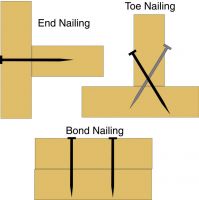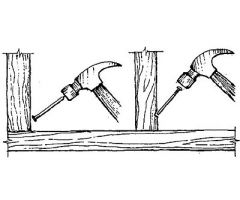Main > Building & fixing > Building > Timber > Fasteners
Nailing structural members: with a hammer, toe-nail (aka skew-nail) 75mm x 3.15mm nails. Framing nail-gun nails used in the same way can be slightly smaller, e.g. 2.3mm diameter.
Securing fasteners with nails: 35mm x 3.15mm if using a hammer, otherwise 32 x 2.3mm for a gun.
kellyjones00 (593)
|
|
|
Main > Building & fixing > Building > Timber > Fasteners
Before securing structural members, make a test to see if the nails split the timber. If this happens, pre-drill a hole 4/5 the diameter of the nail.
kellyjones00 (593)
|
|
|
Main > Building & fixing > Building > Timber > Fasteners
Bolt holes: Structural members secured with a bolt need the bolt-hole to be drilled 0.8 - 1.5mm larger than the bolt diameter.
kellyjones00 (593)
|
|
|
Main > Building & fixing > Building > Timber > Fasteners
Securing floor joists: Toe-nail the joist at every crossing over a bearer. This entails two nails at maximum 45° (no less than 30°) from the horizontal, at either side of the timber.
kellyjones00 (593)

Click to enlarge
|
|
|
Main > Building & fixing > Building > Timber > Fasteners
Prevent splitting timber: Blunt the nail to crush wood fibres rather than splitting them. Also, try dipping the nail in some oil or wax. Or, predrill a hole 4/5 diameter of the nail.
kellyjones00 (593)

Click to enlarge
|
|
|
Main > Building & fixing > Building > Timber > Fasteners
Galvanised fasteners: these are flat or multi-plane plates for attaching structural timbers more strongly than using just nails or screws. They can be as simple as nail plates, which have teeth, and are often used for roof trusses, or as complex as gang-nail multi-grips, which can secure rafters to both top wall plates and adjoining ceiling joist, and secured with 4 x 2.8mm diameter nails per plate end.
kellyjones00 (593)
|
|
|
Main > Building & fixing > Building > Timber > Fasteners
Nail holes should be 8 times the nail diameter from the nearest timber edge, typically >16mm.
kellyjones00 (593)
|
|
|
Main > Building & fixing > Building > Timber > Fasteners
Tie-down straps: If using strap bracing, these 30mm wide strips of galvanised metal are "tie-downs" that hold the studs to the bottom and top wall plates, or rafters to the top wall plates. There is generally one strap every 1200mm along the wall plate (at top and bottom of the wall). The strap should reach a minimum of 250mm along the stud on both its sides.
kellyjones00 (593)
|
|
|
Main > Building & fixing > Building > Timber > Fasteners
Fastening tie-down straps: Use 5 nails per end if using a hammer, or 6 if gun-driven.
kellyjones00 (593)
|
|
|
Main > Building & fixing > Building > Timber > Fasteners
Nail-laminating: For added strength, timbers like bearers are bond-nailed together, along the same principle as two match-sticks held long-wise together are stronger than a single one. The grain / rings are to be in opposing directions to counteract warping. Nails are skewed and staggered at a distance of twice the timber width, and an additional nail added at load-bearing positions.
kellyjones00 (593)
|
|
|
